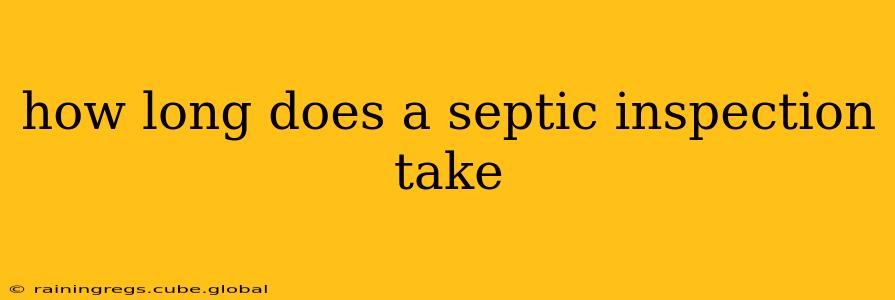How Long Does a Septic Inspection Take?
The time it takes to complete a septic inspection varies significantly depending on several factors. While some inspections might be finished relatively quickly, others can take considerably longer. Understanding these factors will help you manage your expectations and plan accordingly.
What Factors Influence Septic Inspection Duration?
Several key factors determine how long a septic system inspection will take:
-
Size and Complexity of the System: A small, simple septic system with a single tank and leach field will naturally be inspected much faster than a large, complex system with multiple tanks, pumps, and intricate piping. Larger systems require more thorough examination.
-
Accessibility of the System: Easy access to the tank and leach field significantly reduces inspection time. If the system is buried deep, overgrown with vegetation, or located in a difficult-to-reach area, the inspector will need more time to excavate or clear access.
-
Condition of the System: A system in good condition requires less time to inspect than one showing signs of damage, malfunction, or potential issues. If the inspector discovers problems, further investigation and testing might be necessary, increasing the overall time.
-
Inspector's Experience and Methodology: Experienced inspectors are typically more efficient, having developed streamlined processes and a keen eye for potential problems. Their thoroughness, while adding to inspection time, increases the accuracy and value of their report.
-
Additional Testing: If the inspection reveals potential problems, further testing, such as a pump test or soil permeability test, might be required. This significantly extends the inspection process.
How Long Can You Expect to Wait?
While there’s no one-size-fits-all answer, here’s a general timeframe:
-
Simple Systems, Easy Access: A basic inspection of a straightforward system with readily accessible components might take 1-2 hours.
-
Complex Systems, Difficult Access: Inspecting a large, complex system with limited access could take 3-4 hours or longer, possibly extending into a full day depending on the extent of any needed excavation or testing.
-
Inspections Requiring Further Testing: If additional tests are needed, the overall time commitment could increase to a full day or even multiple days to allow for testing, analysis, and report generation.
What Happens During a Septic Inspection?
A typical septic inspection involves several key steps:
- Visual Inspection: The inspector will visually examine all visible components of the system, looking for signs of damage, leaks, or other issues.
- Tank Inspection: The tank is inspected for sludge buildup, scum layers, and overall structural integrity. This often involves entering the tank using specialized equipment.
- Leach Field Inspection: The leach field is inspected for signs of clogging, saturation, or other problems. This may involve probing the soil around the leach field.
- Pump Inspection (if applicable): If the system has a pump, it will be inspected for proper functionality and any signs of wear or damage.
- Report Generation: The inspector will compile a detailed report outlining their findings, including any recommendations for repairs or maintenance.
Do I Need to Be Present During the Inspection?
While you're not always required to be present, it's often beneficial. Your presence allows you to ask questions and gain a better understanding of the inspector's findings. However, if it's inconvenient, coordinate with the inspector beforehand. They will typically provide a written report regardless.
How Much Does a Septic Inspection Cost?
The cost varies widely based on location and the complexity of the system. It's best to obtain quotes from several different inspectors in your area to compare pricing.
By understanding these factors, you can better prepare for your septic system inspection and manage your expectations regarding the time involved. Remember to always choose a qualified and licensed inspector for a thorough and accurate assessment.
